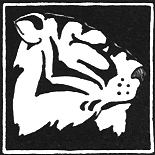 |  |
Wild at Heart Homepage | Contents | Previous Chapter
CHAPTER XV
ON THE RIDGE
1

Unconscious that only an old man’s forgetfulness had saved him from a charge of buckshot and rusty nails in the back, Nanga dropped once more down the face of the cliff and gained the river.
There, his first action was to feel himself all over; and he found that his wounds, though they smarted prodigiously, were none of them very deep, nor were any bones broken. Reassured, he made for the deer-run, where the shadow of a great head had certainly betrayed his enemy.
It was a sketchy path, pitted with the slots of countless deer. But at regular intervals those small, sharp impressions were smudged out by a ponderous foot ten times their size; and, just at the edge, where the sand was wet, the fresh pugmark of the tiger was perfectly outlined--enormous; splayed out beyond the compass of a man’s fingers; yet driven deep.
It was as Nanga had thought. During his struggle with the apes the tiger had crossed.
Without further hesitation Nanga followed, plunging into the deep water that swirled round the tree and swimming, like an otter, under the surface. The water, carrying yet the chill of the far snows, wrapped him round and drove the stiffness and the pain from his limbs, so that, when he stood on the farther bank and shook the drops from his hair, he felt restored and strong, as indeed he needed to be, if he were to challenge the Ridge.
Directly over him it loomed now, dark even at noon. Life and sparkle and colour and sound seemed to stop short, to be left behind, as he looked up at its jagged face and its thick thatch of trees. The sand under his feet was all golden; the river at his back was a sheet of silver, and the woods a mist of green. Behind him, too, was life, with all the soft sounds of life--the music of water and wind and leaves. But ahead was this blank, stark mass of rock and tree and tangled weed, where his feet had never before fallen. No sound came from it; and as if it could repel sound, the song of the water seemed all at once to die away. So that he, who had never been much troubled with such things, went with a sense of oppression and of danger.
For comfort he took the knife out of its leather sheath and examined it, handling it as he had seen the old man do on that far-off occasion. His fingers closed pleasantly over the handle, which was worn and smooth and greasy, and the sunlight rippled on the long lean blade as he turned it in his hand. He tried the sting of it on his palm. He pricked his arm with it, tentatively pressing down until he could feel the sharp point tickling under his skin, and grinned at the new sensation. Then, as if he were already at grips with his enemy, he jabbed and slashed at a stunted bush until the bark hung in tatters and white wood was revealed. He plunged it into the ground, and the good knife stuck and quivered. Last, with a sudden sense of strength and elation, he brandished it and challenged the Ridge.
But the Ridge loomed darkly and silently as before. The fear that lingered in it and about it would not come out to meet his puny challenge. And it was still with that sense of oppression that comes to all in dark and desert places, that he began to climb.
It was a pathless place, and fear lay ahead in the steep solitudes. There was no familiar deer-run where he was going--hardly even a footing for deer. The rocks were piled grotesquely on one another, and it seemed that they jutted ever outward to obscure the view of what was beyond. All among them twisted the shriveled watercourses, beloved of snakes, and in one of them he marked the fat coils, etched in black and gold, of a big python--fit denizen of such a place!
But fear belonged to matters less tangible than a sleeping snake. It lurked rather in the forlorn and lost atmosphere of the caves and clefts, where none but snakes, and the beast with the heart of a snake, dared intrude. The coldness, the absence of those familiar, reassuring scents and sounds of the valley--these things pressed his spirit down.
Nevertheless he climbed doggedly: now over a round boulder that rocked under his feet; now up the rolling pebbles of a slippery watercourse; now through a fissure, cut clean as a knife wound in the face of the black rock. At each step the familiar country below seemed to leap away from him with a giant stride, away from him into the new immensity that was forming at his feet, till, standing at last among the gaunt trees that clothed the crest, he looked back in a wonder that approached dizziness.
His world! It had shrunk so small that the fingers of one outstretched hand could blot it out of sight.
Could that thin, shining snake that wound so feebly out of the hills and buried its head so humbly in the far mists be his river, the fine, bold, stalwart friend of all his days? Sometimes, when he had plunged and reveled in its pools and had run tingling over its sands, he had greeted the river as if it were something abounding with the same life that he felt in his limbs, as if it were a vast fellow-creature of his own. And now--that thin thread!
The great sal forest, again, that could not be crossed in a day’s running--why, it was hardly larger now than himself! And could that fleck of green and gold on the hither side of the water be the warm wood where he had passed his life? that speck his home?
He had never thought of the possibility of anything beyond his world. It had contained, for him, one river, one sal forest, one Sheeshum belt, one bank of hills to bound it, one ridge to shut away the sun at evening. But now, with a suddenness that shook him, new worlds were opened--infinite repetitions of the one he knew. He could see over the old hills into the new, where new rivers gushed and sparkled. He could see far into the fens, where forest melted into forest till all was dimmed in a green and golden haze. Here and there, too, in hill and plain, were pygmy villages hiding like mice in their nooks and crannies, breathing their frail wisps of smoke into the huge air. The immensity of the whole, the insignificance of individual things--for a time his mind could not grasp this at all. He merely stared, gasping.
Then suddenly, in reaction, a fresh mood came to him, a kind of exhilaration such as he had never before experienced. It was the sensation, pure and new and unalloyed, of having the world at his feet. Coming, as it did, naturally, with out preparation or complete understanding, it overwhelmed him with a consciousness of nothing but his own power. Everything that he saw below him--wood and river, village and fen--was on a pygmy scale. But he--he was a giant! With a wave of his hand he could blot out a mountain or destroy a forest. With another wave he could recreate them. There was nothing that he could not do.
He captured the mood and made it his own; laughed down from his height on the world. Even when, turning, he saw the twisted trees and the labyrinth of rocks and realized his task, he still retained the buoyancy that he needed to carry him through the day. And fear, at least, no longer lingered in the solitudes.
2
The task before him was tremendous. He had come out to seek for the craftiest, the softest-footed creature in the world, in its chosen home; and of all the haunts chosen by tiger the Ridge was the most baffling.
In the deepest fen there would always be one deep place which would draw the eye and proclaim itself, to those who knew, as the certain lair of tiger. In the thickest wood there would always be just one cane-brake a little more likely than the other cane-brakes; or in the foot-hills, just one thorny hollow that no tiger could pass by. But not so with the Ridge. The Ridge was chaos uncharted. It was as if a sudden convulsion in some dim past had hurled up all the boulders in the river-bed into a shivering heap, and, while the heap still quaked and rocked, had scattered the trees of a forest broadcast, so that there was no order among the rocks and no two trees grew at the same angle. Compared with it, the wildest forest was orderly, for in the wildest forest natural paths and alleys and vistas disclose themselves, and it is of these that the hunters and the hunted take advantage. But here paths were unthinkable; and in all that tumbled, tangled mass there could be only one certain clue to the tiger’s lair: water.
Somewhere among the innumerable watercourses, the runnels scored in a tortuous network by the rains, there must be one at least that never ran dry. Otherwise no tiger could dwell on the Ridge. But how could Nanga ever hope to find it?
He had expected at least some one of the many signs by which tiger is betrayed. A fresh pugmark, or even an old pugmark, pointing a trail; a warning cry from bird or beast; or, best, the sudden scent of its lair. But the ground was parched; the air carried no scent; and there were no birds or beasts to give warning. There was indeed only one course open to him: to search the Ridge, rock by rock, cranny by cranny, from its junction with the hills to the stark cliff which stood out so abruptly from the plain, for a water-hole. A water-hole in a wilderness.
He might have lain down and slept, and so have gathered strength; then, in the evening, have relied on catching his enemy away from its chosen ground, in the lost garden or among the fens. But he could not wait. The task which he had set himself had become the master of his mind, and, an angry master, drove him relentlessly. Once started, he could not stop.
Noon saw him feverishly scrambling among the massed boulders that marked the junction of the Ridge with the innocent grassy mountain from which it so unaccountably sprang. Three hours later the sun beat down on him as he stood, weary and baffled, on the brink of the last sheer cliff, and gazed despondently on the patchwork of the plains. And the waning sun found him once more on the high hillside, with the Ridge all below, holding its secret as fast as ever.
He had traversed its whole length, and back again. He had crossed countless chasms; had peered, it seemed, into all the caves and crannies of the earth; and had stalked a million shadows. And now he was as wise as when he had started. He had seen-nothing. Not a trickle, not a drop of water was there on the Maiwani Ridge.
The giant of his morning’s mood had dwindled to a pygmy again--a lone, limp pygmy, with tassels of draggled hair about his shoulders, squatting on a hillside which the sun was slowly turning to rose.
He was the very picture of dejection. He was beaten, and he knew it, but he could do no more. In all that desolation just at his feet, it seemed that there could not be left one secret place that he had not probed. Fame had lied to him. There was a tiger indeed--too well he knew it--but not a tiger of the Ridge. The Ridge was too desolate a dwelling-place for even the king of desolation himself.

He was the very picture of dejection
He did not see the intense beauty of evening--the air laden with gold-dust, the river a feather of shimmering gold. Though he stared at the rocks, he did not see how magically they turned from gray to rose, and from rose to amethyst. He saw only, in a dim and distant background, the face of her whom he had lost and had failed even to avenge. All the ache and the hunger had come back to him, but there were no soft fingers now to soothe him or to lighten the load that was dragging down his head. It was left to him to obey the law of the forest; to accept the lot of the maimed and the sick and the spiritless; to creep into some quiet hole and die.
Then, suddenly, in his darkest hour, when the comfort of tears and the philosophy of even the feeblest among men were denied to him, and hope seemed to have gone astray, he saw that which drew him to his feet.
The sun was poised over the hilltop at his back like a blood-red fruit ready to fall. But ere it sank he saw a single shred of that glowing colour caught up and reflected among the blue shadows that now clothed the Ridge. A trick of the sunset, and the chance that had led him to climb above the Ridge and look down on it at this moment, had revealed something that had been hidden from him in the full glare of day--something essential, full of meaning.
He had found his pool of water at last.